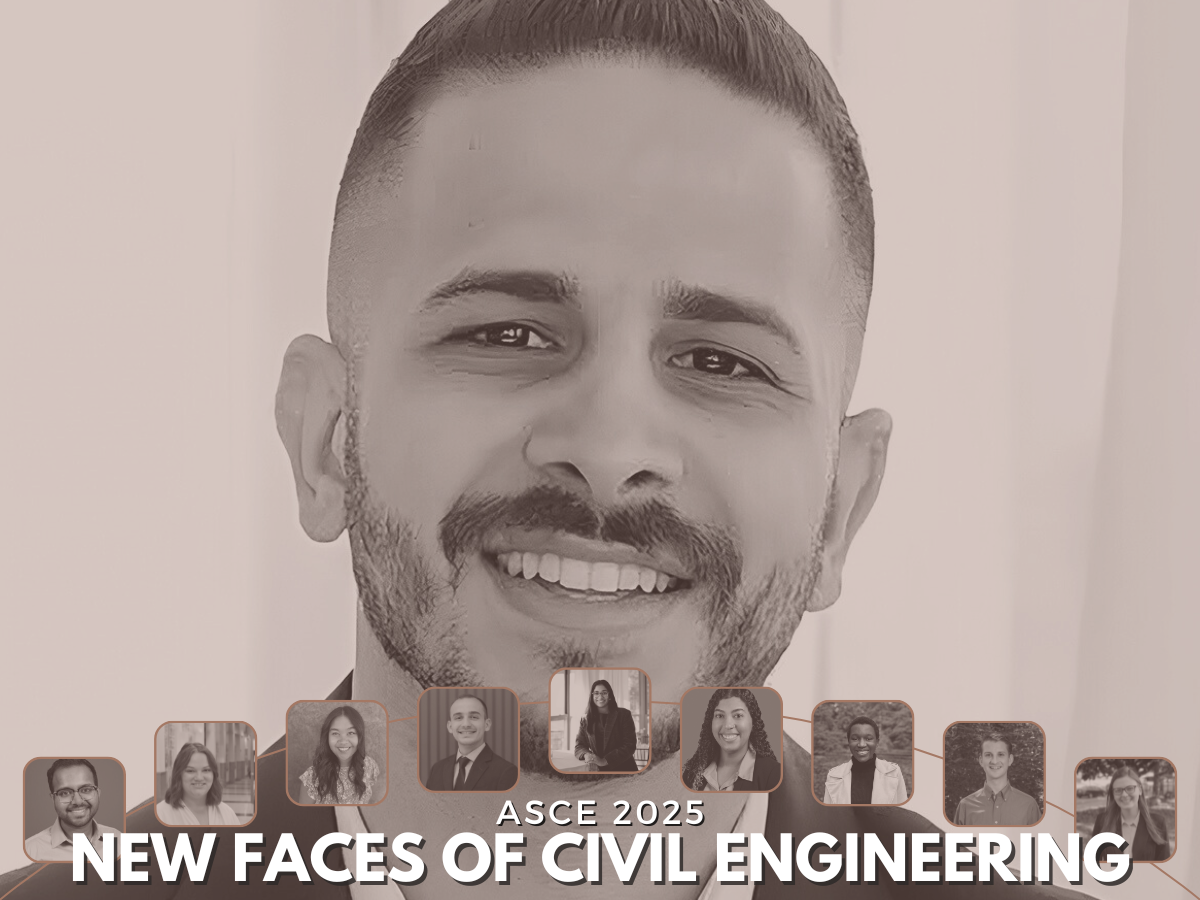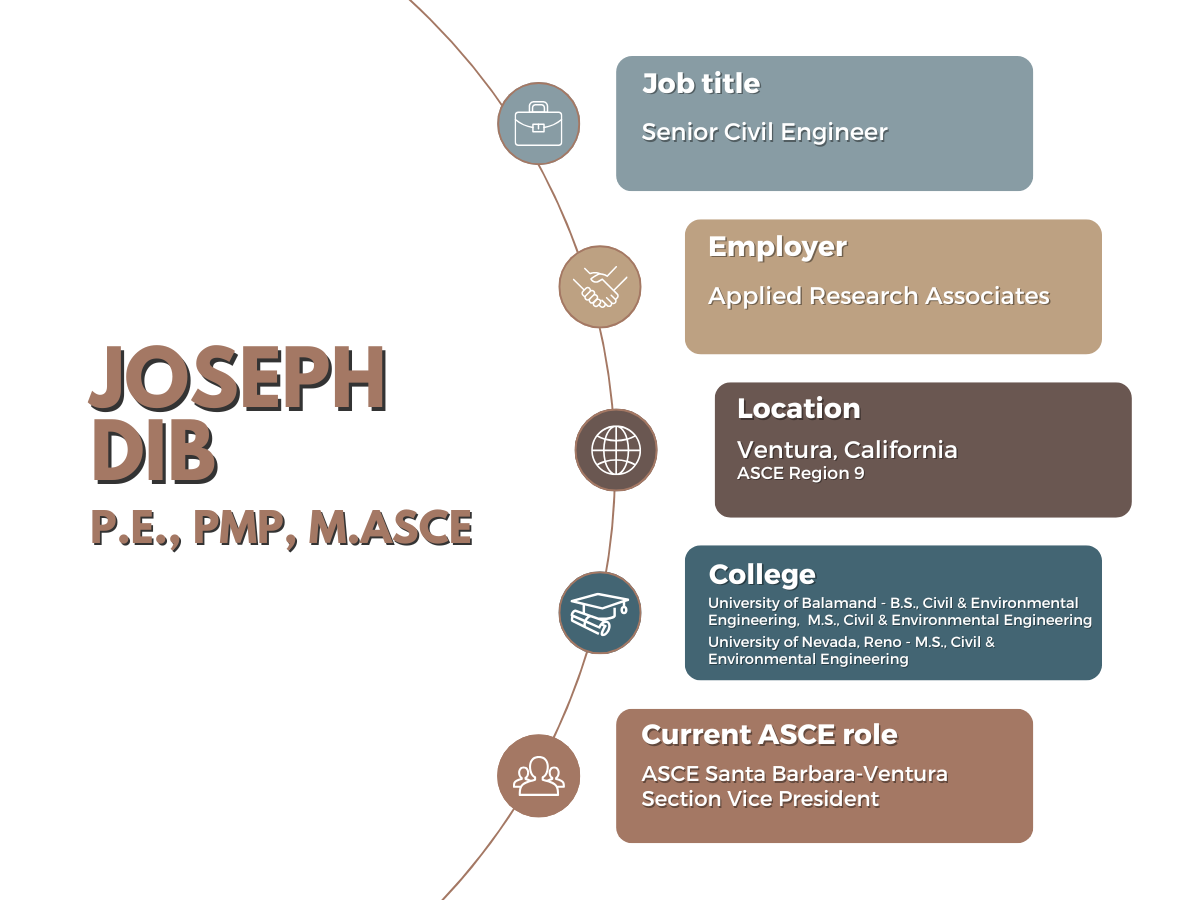

Joseph Dib remembers a sentence one of his professors had written in his classroom.
"Success is when hard work meets opportunity."
The words of wisdom from Elie Hajj at the University of Nevada, Reno, became a sort of signpost for Dib as he’s navigated his early career far from his family and home in Lebanon.
"That was his model. It really stuck with me," said Dib, who now works as a senior civil engineer for Applied Research Associates in Ventura, California. "You have to be honest and work hard. And if you do, then you’re going to get where you need to be. You’re going to be appreciated."
It has been quite the journey for Dib, who began his civil engineering studies at the University of Balamand in El Koura, Lebanon. As he was finishing his (first) master’s there, he found himself with several career options.
It was a good problem – to be wanted by so many people in so many different places – but a problem, nonetheless.
Dib had the opportunity to turn the internship he was completing as a site engineer into a full-time job with the company. He also had job offers in Dubai and Saudi Arabia. All good chances to make real money right away. And yet …
"I was talking with my professor, and he said, 'There’s an opportunity in the U.S. you might want to apply to. It could really open doors for you,'" Dib said.
"It was a hard decision, especially because, ultimately, my goal is to always help my family. I need to support my family, given the economic situation in Lebanon. And it was challenging for me to go from making money in the industry to continuing learning to see where that will get me. Looking back, it definitely was the right decision."
He came to Reno for more education, and his parents and sister, Liza, remained home in Lebanon, living their lives. Liza has since married and had two daughters, whom Dib got to see last summer.
"That was hard, because I am very close to my sister," Dib said. "In Lebanon, the culture is really based around family. Me and my sister were the only children, so we were always doing everything together. And then all of a sudden, I was moving miles and miles away."
But Dib has thrived in America, advancing in his career in pavement engineering, while taking on leadership roles in the ASCE Santa Barbara-Ventura Branch and in the American Public Works Association.
"The reason I got involved with ASCE was maybe I was trying to find that family, that friend group here in the U.S.," Dib said. "In Lebanon, I had all my friends surrounding me. So, it was tough to not have my family and friends here with me, and that’s why I joined ASCE to try to find those professional connections."
"And I found this group of young professionals with the Santa Barbara-Ventura Branch. At this point, I am proud to call them my friends."
ASCE has honored Dib as a 2025 New Face of Civil Engineering. He spoke recently to Civil Engineering Source about his career.
Civil Engineering Source: What accomplishment or aspect of your career are you most proud of?
Joseph Dib: I would say making the move to the United States and getting my master’s degree. That was a very hard decision and a difficult period in my life.
I feel like that was a huge, huge accomplishment for me, coming from Lebanon to a new culture and a new education system.
It took me a little bit of time to adjust to the people, to the whole life I was living in Reno, Nevada. The winter here was really, really harsh. [laughs]
Everything was a little bit different. But, really, looking back, I think that’s what equipped me to achieve what I’m achieving now.
When I first got to Reno, there was a Lebanese and international community already in the area and at the university. In those early days, I couldn't fully recognize how meaningful this community would become. When you’re first moving away from your family and your friends who you’ve lived with for more than 20 years, it takes some time to accept the new people.
My professor – Elie Hajj – was also from a Lebanese background, so he was very supportive. Our graduate program really became a community, and I think it was the culture my professor promoted: this culture of working together and setting us all up for success – to graduate and then to go into the real world and succeed there.
I feel like I’m fortunate that that specific graduate program equipped me with all these skills – not only technical skills, but also how to live and succeed in the U.S.
Source: You’ve done a lot of amazing technical work early in your career. Can you talk a little bit about some of the things you’ve been working on?
Dib: When I was in Lebanon, I was more focused on geotechnical engineering. But then during my last semester, I was shifting slowly to pavements, which is not maybe a very exciting topic to a lot of people. It wasn’t until I moved to the U.S. and I started my master’s degree and going through all the pavement-engineering-focused courses that I really started to understand it’s a completely different field.
And it is more related to sustainability than I realized as well. If you look at the world, we have a huge number of paved roads, and we have been using a foreign material that we’re putting on our roads. The biggest focus of pavement engineering research was and still is trying to recycle that material.
I did research for my master’s degree here, looking at cold in-place recycling, which involves milling the existing pavement layer, adding a new bituminous material called emulsion, and then compacting it in place.
That’s one way of recycling the pavement, but there are really a lot of other ways that are still untapped and still in the research phase.
Switching to my consulting career now, I started in 2021 with Applied Research Associates. I am able to do both. I am able to do the research side, still working on sustainable materials with a few pilot projects. But it isn’t research in the lab anymore. It is more applied in the field.
I’ve also done consulting, helping cities, counties, or ports assess pavement conditions. We operate several state-of-the-art vans that drive the roads while collecting and processing high-resolution images. Then in the office, we use AI to detect cracks and potholes. We then transfer this distress data into a pavement management system, which helps agencies prioritize road repairs and optimize their budget allocation.
So, it’s very practical. And it’s really fun.
It was very interesting for me to understand the technology, apply it, and then go to city councils and present the results: "Here’s where you need to invest your money, and this is where you can save money over the next five to 10 years to maintain your road network safe and operational while keeping the public satisfied."
Source: What do you hope will be your biggest impact on the profession?
Dib: I want to continue on this course of trying to bridge the gap between research and practical applications. There is a lot of funding that goes into research; there are a lot of great ideas. But so often, they never see the light of day. They never get implemented in the real world.
And especially now with the increased use of AI, I want to bridge that gap and use these new tools to accelerate the process of applying those ideas.
That’s the technical side. On the managerial side, I’d like to continue moving upward – be more a part of the hiring process and get into project management.
I’ve seen that we’ve struggled to attract the new generation to public works and civil engineering. It seems this field isn’t very appealing to younger generations. They think, "Oh, I’m not good at math or physics, so I won’t succeed in engineering." While there's some truth to this concern, it doesn't tell the whole story.
So really what I would hope to achieve in the next 10 to 15 years – and maybe it’s something that I’m already trying to do as part of ASCE and APWA – is to break down those misconceptions that some of the new generation has about civil engineering and make it more accessible and more attractive. I’m fortunate that ARA shares this vision of developing future leaders and fully supports my professional growth and facilitating my mission.
And if you ask me how I’m going to do that, I don’t have all the answers yet. [laughs] But I'm committed to doing my part by participating in and organizing events for young engineers, especially K-12 activities, and making engineering fun and engaging for them.



